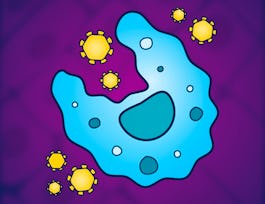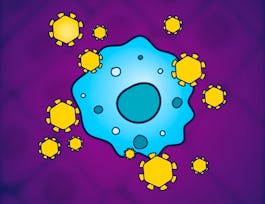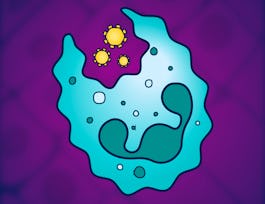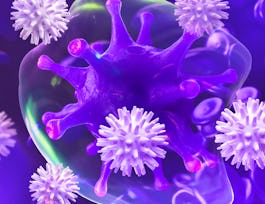Our immune system is a powerful network. It protects us from external threats, such as harmful substances and pathogenic agents, as well as cellular changes which could lead to diseases. Complications emerge when our natural defences do not function properly, which can result in immune disorders. These can take the form of less severe issues such as insect allergy. Others are more harmful, such as auto aggressive immune reactions, that lead to localised or systemic tissue damage.



Immunology: Immune Failures and Cancer Immunology
This course is part of Immunology: The Immune System and its Failures Specialization


Instructors: Malgorzata (Maggie) Trela
Sponsored by MAHE Manipal
4,543 already enrolled
(91 reviews)
Recommended experience
What you'll learn
In this course, you will learn the causes and consequences of a failing immune system.
You will explore the impact of genetic deficiencies on the immune response.
You will understand the relationship between tumour and immune cells and how this leads to tumour survival.
Details to know

Add to your LinkedIn profile
8 assignments
See how employees at top companies are mastering in-demand skills

Build your subject-matter expertise
- Learn new concepts from industry experts
- Gain a foundational understanding of a subject or tool
- Develop job-relevant skills with hands-on projects
- Earn a shareable career certificate


Earn a career certificate
Add this credential to your LinkedIn profile, resume, or CV
Share it on social media and in your performance review

There are 4 modules in this course
In module one, you will explore the genetic regulation of our immune system. Through the example of primary immuno deficiencies and looking at their detrimental effect on our innate and/or adaptive responses, you will discuss their individual pathological manifestation and some potential therapeutic avenues of investigation.
What's included
4 videos6 readings2 assignments
In module two, our expert will take you on a journey to explore tertiary lymphoid structures. These are immunological organisations that develop in tissues affected by chronic inflammation in response to various alienations. Interestingly, you will explore why these structures can sometime hinder or benefit disease resolution.
What's included
1 video3 readings2 assignments
In module three, you will discover that the outcome of cancer heavily relies on the crosstalk and relationship between the tumour and immune cells found in its micro-environment. You will explore this relationship from the point of view of tumour escape mechanisms and how these manipulate our immune response. Finally, you will learn about therapies that use our immune system to combat this deadly disease.
What's included
3 videos2 readings2 assignments
With approximately ten percent of the global cancer burden potentially attributed to viruses, our last module of the course, module four, will explore the relationship between viral persistence on cancers. Importantly, as viral infection is not sufficient for cancer to develop, you will investigate the physiological contribution of our immune system in this complex landscape.
What's included
2 videos2 readings2 assignments
Instructors

Offered by
Why people choose Coursera for their career




Learner reviews
91 reviews
- 5 stars
74.72%
- 4 stars
20.87%
- 3 stars
3.29%
- 2 stars
0%
- 1 star
1.09%
Showing 3 of 91
Reviewed on Sep 9, 2023
Course was very interesting and much informative with help examples and diagrammatic explanations helped alot to understand the concepts. Thank you
Recommended if you're interested in Health

Imperial College London

Imperial College London

Imperial College London

Open new doors with Coursera Plus
Unlimited access to 10,000+ world-class courses, hands-on projects, and job-ready certificate programs - all included in your subscription
Advance your career with an online degree
Earn a degree from world-class universities - 100% online
Join over 3,400 global companies that choose Coursera for Business
Upskill your employees to excel in the digital economy



